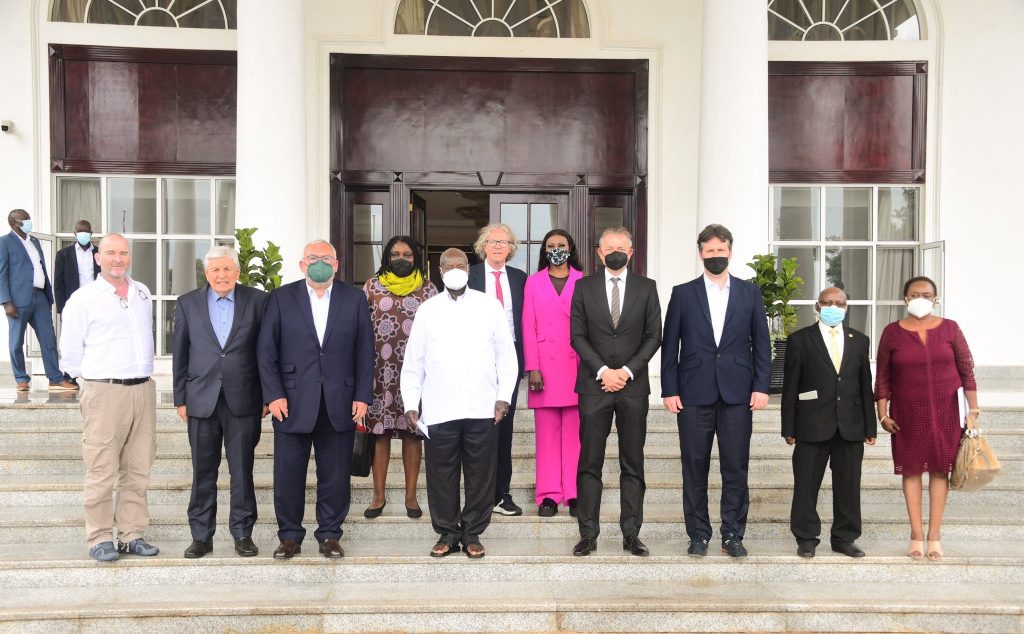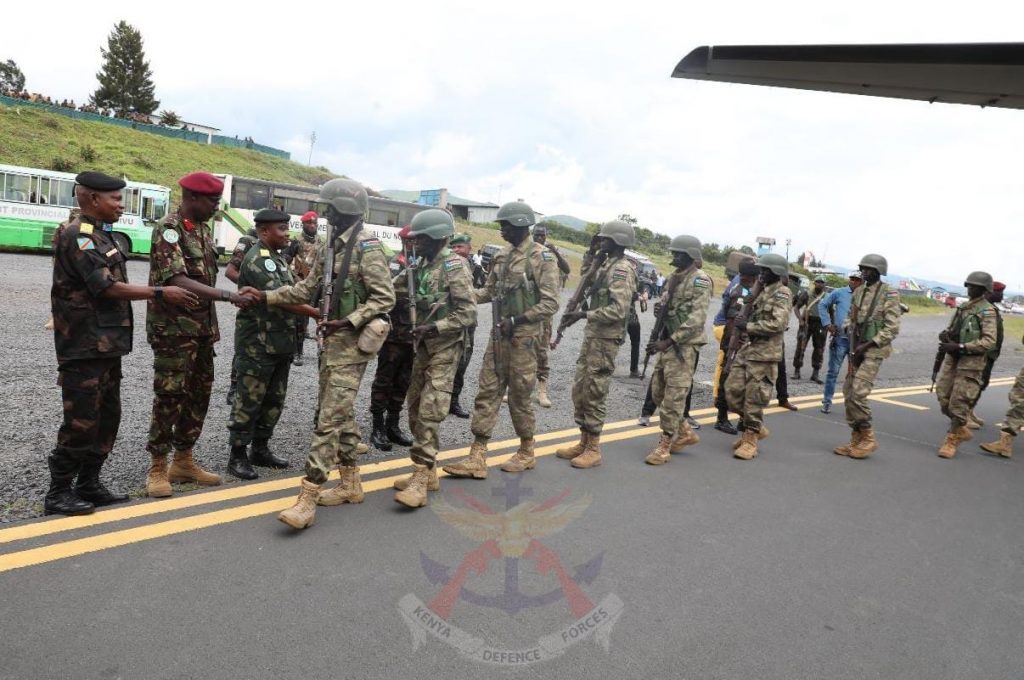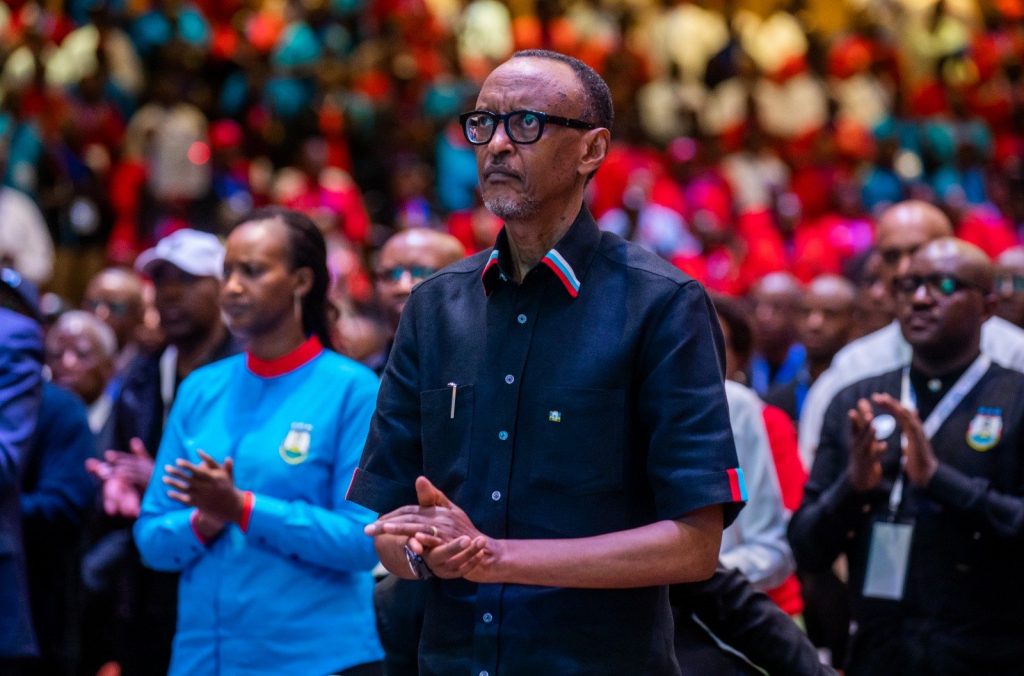Uganda’s President Yoweri Museveni last week met the former Chancellor of Austria Alfred Gusenbauer together with a delegation eyeing to invest in sectors of agriculture, housing and construction, affordable solutions, information technology, forestry and environment and architecture.

President Museveni informed his guests that there is a big housing deficit in Uganda for teachers, medical personnel, police and industrial workers among others. He recommended the investors to work with the National Enterprises Corporation, the commercial arm of the Uganda People’s Defence Forces (UPDF) and the National Housing and Construction Corporation to explore partnerships.
President Museveni also asked the Austrian investors to interest themselves in the technology and equipment for Ugandan manufacturers especially in the processing of coffee, beef, leather, fruits, milk, fish, minerals and forest products.
President welcomes coffee value addition investor.
Mr Museveni, also in the same week met Amir Hamza Esmail, the Chairman of Amir Hamza (T) LTD a coffee production plant based in Tanzania. Mr. Hamza, who is also the Chairman of the Coffee Association in Kampala expressed interest in adding value to Ugandan coffee.
He informed the President that his company based in Bukoba Tanzania already exports instant coffee to regional and international markets.
He praised President Museveni for championing the campaign to add value to coffee in Africa in general and Uganda in particular adding that the President deserved an award for his efforts.
“If there was an award for a Nobel prize for value addition to coffee on the continent of Africa, Your Excellency you deserve one,” he said.
Kenya opposition call off protests
Kenyan opposition leader Raila Odinga on Sunday called off demonstrations planned for Monday and said his party would sit down for dialogue with the government after two weeks of protests.
Odinga however stated that his group retained the right to assemble, to demonstrate, petition, and speak, calling this right iron-clad as provided for in the constitution.
The announcement came after President William Ruto urged the opposition to cancel their protest and participate in a bipartisan parliamentary committee to work through their concerns related to last year’s elections.
Odinga has accused Ruto of stealing the presidency and considers his government illegitimate, although the Supreme Court of Kenya upheld the results.
The opposition leader welcomed Ruto’s “olive branch” but warned they could resume protests if progress was not made.
“We reserve our right to call for demonstrations should this process not bear fruit,” he added.
“Should there be no meaningful engagement or response from Hon Ruto to our counter-offer, we resolve to resume our demonstrations after one week.”
Three people have died since Odinga called protesters to the street for the first time on March 20, vowing to march every Monday and Thursday until their concerns are met.
The protests triggered clashes with riot police firing tear gas and water cannon at demonstrators, while many businesses have been looted and property vandalised.
South Sudan troops arrive in DR Congo

A first batch of South Sudanese soldiers arrived in Goma, in the east of the Democratic Republic of Congo on Sunday. The group of at least 45 soldiers is joining a regional military force in the region wracked by the M23 rebellion.
The seven-nation East African Community (EAC) military force was created last June to oversee the withdrawal of M23 fighters from eastern DRC, a region plagued by dozens of armed groups that have waged wars since the 1990s and 2000s.
Since re-emerging from dormancy in late 2021, M23 rebels have captured swathes of territory in North Kivu province and advanced within several dozen kilometres of its capital Goma reports indicate.
Several regional initiatives intended to defuse the conflict such as ceasefires have failed to materialize.
March 30 was supposed to mark the end of the withdrawal of “all armed groups”, according to a timetable adopted in mid-February by the EAC.
EU earmarks €9 million for Burundi refugees
The EU has allocated €9 million to assist Burundian refugees in neighbouring countries and those who voluntarily returned home.
Since 2020, Burundian refugees – who fled the violence in Burundi in 2015 have started to return home, but over 300,000 of them still remain in neighbouring Tanzania, the Democratic Republic of the Congo (DRC), Rwanda, and Uganda.
Out of the total amount of €9 million, €1.5 million will be allocated to projects on disaster preparedness.
In 2022, over 75,000 people were internally displaced in Burundi, mainly due to natural hazards. In February 2023, over 300,000 Burundian refugees were registered in the four main asylum countries: Tanzania, DRC, Rwanda and Uganda. Most of them rely entirely on international assistance to cover their basic needs, such as food, health, water, sanitation, hygiene, shelter, and education.
Since 2017, more than 200,000 Burundian refugees have returned to their country, having left their country due to violence during the 2015 elections.
Kagame re-elected

Rwanda President Paul Kagame has been re-elected the chairman of the ruling party, Rwandese Patriotic Front (RPF-Inkotanyi) at the party’s 16th congress which convened on Sunday.
The Rwandan leader got 2, 999 votes, accounting for 99.8% of the total votes while his closest contender Abdulkarim Harelimana got 3 votes or 0.2% according to a Rwandan national daily.
Kagame, Rwanda’s president for 22 years will now serve another five years as head of the Rwandan Patriotic Front, the political party he has led since 1998.
The 2,000 supporters present at the congress in Kigali voted Sunday on the occasion of the 35th anniversary of the ruling party since the end of the genocide.
Meanwhile, Rwanda and the US are working to mend relations following the release of Hotel Rwanda hero Paul Rusesabagina, who had been sentenced to a 25-year jail term on terrorism charges in a trial that his family and supporters dismissed as a sham.
Rusesabagina, a Rwandan who was portrayed in the film Hotel Rwanda as a hero who saved lives during the 1994 Genocide against the Tutsi, is a permanent resident of the US and also a Belgian citizen.
The East African news site reports that despite Washington applying pressure, including threatening to impose sanctions, Rwanda had been defiant and maintained it would not bow to international pressure to release Rusesabagina, who had been sentenced to 25 years in prison over his ties to a group opposed to Rwandan President Paul Kagame.
During his trial, Rusesabagina acknowledged being a leader in the opposition group, but denied responsibility for attacks carried out in Rwanda by the group’s armed wing.
Mr Rusesabagina had spent more than 900 days behind bars before he was released last Saturday.
A vocal critic of Rwandan President Paul Kagame, Rusesabagina disappeared in 2020 during a visit to Dubai in the United Arab Emirates and appeared days later in Rwanda in handcuffs. His family alleged he was kidnapped and taken to Rwanda against his will to stand trial, according to the East African.
Rattling fantastic info can be found on blog.Expand blog
Your point of view caught my eye and was very interesting. Thanks. I have a question for you. https://www.binance.com/zh-CN/join?ref=VDVEQ78S